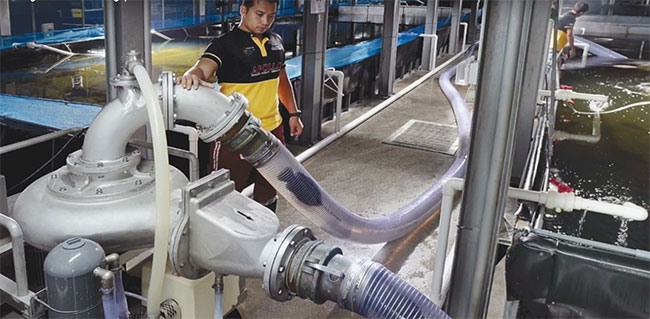
Features
Profiles
Singapore’s Apollo Aquaculture ramps up vertical farming
Apollo Aquaculture Group (AAG) in Singapore is building an eight-story RAS in the city-state in order to produce grouper and shrimp. The company hopes to be in full production with its new RAS by 2020.
June 20, 2018 By Ruby Gonzalez
 Apollo Aquaculture Group (AAG) in Singapore is building an eight-story RAS in the city-state in order to produce grouper and shrimp.
Apollo Aquaculture Group (AAG) in Singapore is building an eight-story RAS in the city-state in order to produce grouper and shrimp.The company built its first vertical fish farm in Singapore during 2012, and AAG president Eric Ng alluded to this project in late 2017, in an interview with Channel News Asia, when he said he wanted the company to grow bigger by going higher.
“We believe today, we are just getting started. We are hoping to make this system even more mega,” Ng said. Adding more to their original three-story system “can actually allow us to harvest more on a smaller footprint,” he added.
AAG’s current farm, located in Lim Chu Kang, has three stories, each one holding two 135-sq m ponds. It is backed by AquaDeck, a fully automated, multi-tier, closed aquaculture system conceptualized and built by Ng from scratch.
The Singapore firm is also in the middle of a 12-hectare construction project in Brunei, a joint venture with Brunei’s KR Apollo. Its groundbreaking was held in February 2017, and full development is expected by 2022. Ninety-five percent of the projected maximum annual yield of 5,000 tons will be food.
The Brunei site will have facilities similar to AAG’s farm in Singapore. For instance, the vertical fish-farming system will be remotely controlled and monitored from Apollo Aquaculture’s farm in Singapore.
Ng said the Brunei farm “also ensures that we have a backup in case anything happens to our farm here.”
AAG has developed a prototype of the floating pond, a unique concept which urban, industrial and infrastructure consultancy, Surbana Jurong, had discussed with the Singapore government last year.
“Being modular and scalable, floating ponds can be built and can function within any urban space available, ranging from a park space, to unused roof space as well as community spaces within larger commercial developments. Having the entire fish farm ecosystem within the city will bring food production and processing closer to the residents and encourage them to take a proactive role in productive farming,” Surbana said in a statement.
Surbana plans to add self-sustainable features to the prototype such as solar panels, rainwater collection, and converting left-over nutrients from the purification process as fish feed.
Print this page





